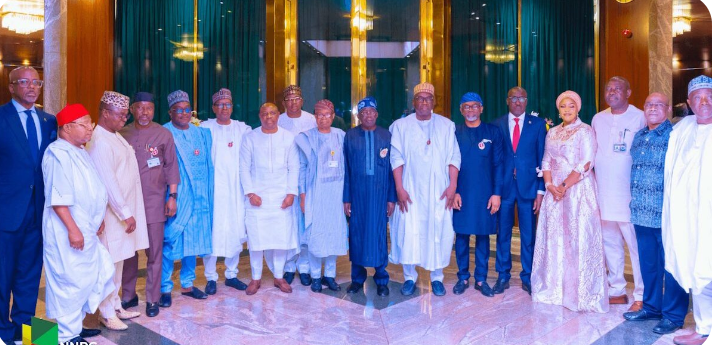
Tinubu Sets Strategic Tone for Nigeria’s Oil Future as He Swears in New NNPCL Board

In a move that signals a decisive shift in Nigeria’s oil and gas leadership strategy, President Bola Ahmed Tinubu on Thursday officially swore in the newly appointed board and management of the Nigerian National Petroleum Company Limited (NNPCL), nearly two months after their initial appointment on April 2, 2025. The high-stakes ceremony was held at the Aso Rock Presidential Villa, Abuja, underscoring the gravity of the moment as the nation recalibrates its energy governance amid global and domestic pressure for reform.
The event, though brief in duration, carried substantial symbolic weight. With President Tinubu presiding, the ceremony marked the formal inauguration of a board that represents both geographical balance and professional depth. At the helm is Ahmadu Kida, the new Non-Executive Chairman, joined by Bashir Ojulari as Group Chief Executive Officer—a pairing that industry analysts have described as “technically sound and politically astute.”
The 11-member board embodies a mosaic of Nigeria’s six geopolitical zones and key economic ministries, highlighting Tinubu’s intention to harmonize regional inclusion with policy execution. Members include seasoned professionals like Babs Omotowa, former Managing Director of Nigeria Liquefied Natural Gas (NLNG), representing the North Central; and David Ige, an oil and gas executive with deep industry roots, representing the South-West. Also present are Adedapo Segun and Bello Rabiu (North West), Yusuf Usman (North East), Austin Avuru (South-South), and Henry Obih (South-East). Government representatives Lydia Jafiya from the Ministry of Finance and Aminu Ahmed from the Ministry of Petroleum Resources round out the board, tasked with ensuring regulatory alignment and financial oversight.
This board inauguration is more than ceremonial pageantry—it’s a clear political and economic signal. Tinubu, who has staked much of his presidency on resetting Nigeria’s economic fundamentals, appears poised to revamp the country’s oil and gas sector, long plagued by inefficiency, corruption, and fluctuating output. The restructuring of NNPCL into a commercially driven entity under the Petroleum Industry Act (PIA) was one of the landmark developments of recent years, and Thursday’s swearing-in sets the tone for what insiders believe could be a more transparent, investor-friendly oil sector.
What makes this board particularly unique is its blend of public sector experience and private industry expertise. For example, Austin Avuru is well-known in oil circles as the co-founder and former CEO of Seplat Energy, a success story in Nigeria’s indigenous exploration and production sector. His inclusion signals a nod to homegrown capacity and a shift away from overdependence on foreign multinationals. Similarly, the appointment of Babs Omotowa, with global energy governance experience, suggests a board that can engage not only with domestic concerns but also with the international investment community.
The ceremony was attended by key figures in the Tinubu administration, including Minister of Finance Wale Edun, Minister of Information Mohammed Idris, and Minister of Petroleum Resources Heineken Lokpobiri. Their presence underscored the collaborative inter-ministerial synergy Tinubu hopes to foster, particularly as the nation contends with global oil price volatility, a weakening naira, and rising inflation. The broader goal appears to be synchronizing energy governance with macroeconomic policy to drive growth and attract investment.
Almost immediately after the inauguration, President Tinubu departed for the All Progressives Congress (APC) National Summit at the State House Banquet Hall—a political convergence that further emphasizes how intertwined Nigeria’s economic aspirations are with its political architecture. The APC Summit, coming just as the new NNPCL board takes shape, reflects the party’s push to consolidate its grip on economic policy through strategic appointments.
Critics and industry watchers will be keenly observing whether this new board can truly deliver on the promise of transparency, efficiency, and profitability that the reformed NNPCL model aspires to. The Nigerian oil sector, for all its wealth potential, remains burdened by persistent theft, pipeline vandalism, subsidy politics, and underinvestment in infrastructure. The challenge before Bashir Ojulari and his team is monumental—but so too is the opportunity to change the trajectory of a sector that accounts for over 70% of Nigeria’s foreign exchange earnings.
The Tinubu administration’s approach suggests a preference for technocratic competence over political patronage—a marked departure from past patterns of appointments in the sector. This new board is expected to strengthen corporate governance, drive commercial orientation, and align NNPCL with global standards. Whether they succeed or not will likely define the legacy of the Tinubu presidency in economic terms.
The strategic appointment of board members from all six geopolitical zones also carries political weight. It demonstrates Tinubu’s commitment to national inclusivity—a principle that could prove vital in diffusing regional tensions and building consensus around tough reforms. In a country as ethnically and politically diverse as Nigeria, such moves are not merely cosmetic; they’re necessary for governance stability.
As Nigeria grapples with dwindling oil production, competition from emerging African oil producers, and a global push for cleaner energy, the stakes for NNPCL have never been higher. Investors are watching, the public is waiting, and the international community is listening. Inaugurating a strong board is one step—but the road to reform is long, arduous, and requires unwavering political will.
Thursday’s swearing-in of the NNPCL board may have lasted only a few minutes, but its implications will reverberate for years to come. President Tinubu has thrown the gauntlet, placing capable hands at the helm of Nigeria’s most critical economic engine. Whether this gamble will yield dividends or fall short of its transformative promise remains to be seen. But one thing is clear—Nigeria’s oil sector is officially under new management, and the world is watching.


